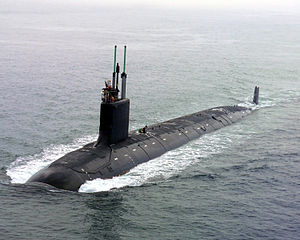
A submarine (or simply sub) is a watercraft capable of independent operation underwater. It differs from a submersible, which has more limited underwater capability. The term most commonly refers to a large, crewed vessel. It is also sometimes used historically or colloquially to refer to remotely operated vehicles and robots, as well as medium-sized or smaller vessels, such as the midget submarine and the wet sub. The noun submarine evolved as a shortened form of submarine boat; by naval tradition, submarines are usually referred to as "boats" rather than as "ships", regardless of their size.
Although experimental submarines had been built before, submarine design took off during the 19th century, and they were adopted by several navies. Submarines were first widely used during World War I (1914–1918), and now figure in many navies large and small. Military usage includes attacking enemy surface ships (merchant and military), attacking other submarines, aircraft carrier protection, blockade running, ballistic missile submarines as part of a nuclear strike force, reconnaissance, conventional land attack (for example using a cruise missile), and covert insertion of special forces. Civilian uses for submarines include marine science, salvage, exploration and facility inspection and maintenance. Submarines can also be modified to perform more specialized functions such as search-and-rescue missions or undersea cable repair. Submarines are also used in tourism, and for undersea archaeology.